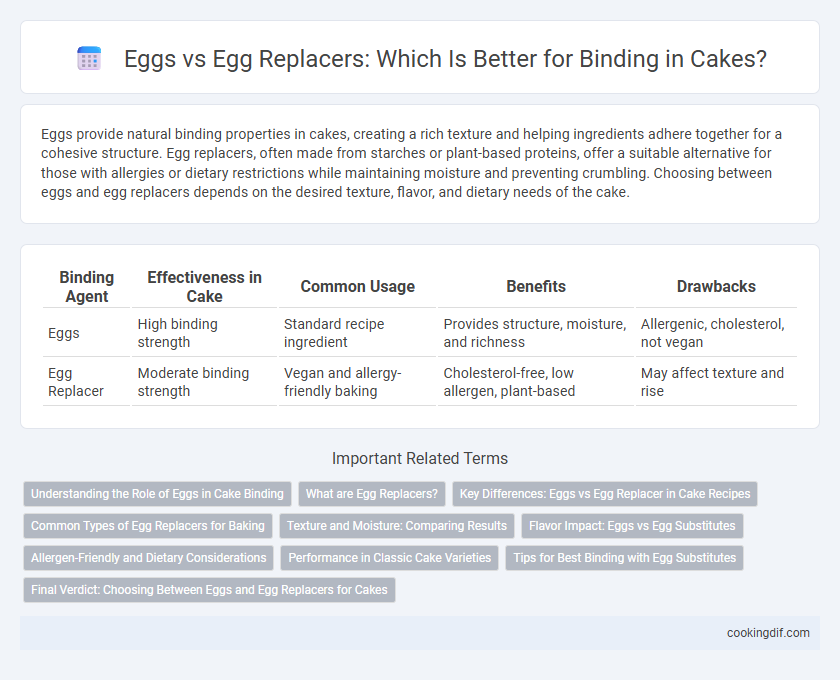Eggs provide natural binding properties in cakes, creating a rich texture and helping ingredients adhere together for a cohesive structure. Egg replacers, often made from starches or plant-based proteins, offer a suitable alternative for those with allergies or dietary restrictions while maintaining moisture and preventing crumbling. Choosing between eggs and egg replacers depends on the desired texture, flavor, and dietary needs of the cake.
Table of Comparison
| Binding Agent | Effectiveness in Cake | Common Usage | Benefits | Drawbacks |
|---|---|---|---|---|
| Eggs | High binding strength | Standard recipe ingredient | Provides structure, moisture, and richness | Allergenic, cholesterol, not vegan |
| Egg Replacer | Moderate binding strength | Vegan and allergy-friendly baking | Cholesterol-free, low allergen, plant-based | May affect texture and rise |
Understanding the Role of Eggs in Cake Binding
Eggs play a crucial role in cake binding by providing structure, moisture, and emulsification that help hold ingredients together and create a tender crumb. Egg replacers, often made from ingredients like flaxseed meal, applesauce, or commercial products containing starches and leavening agents, mimic these binding properties but may alter the texture and rise. Understanding the composition and functionality of eggs allows bakers to select the most suitable egg replacer to achieve a similar binding effect in vegan or allergen-friendly cakes.
What are Egg Replacers?
Egg replacers are plant-based or synthetic ingredients designed to replicate the binding and moisture-retention properties of eggs in cake recipes. Common egg replacers include flaxseed meal mixed with water, applesauce, mashed bananas, and commercial products containing starches or leavening agents. These alternatives enhance texture and structural integrity without the use of animal products, making them ideal for vegan or allergen-free baking.
Key Differences: Eggs vs Egg Replacer in Cake Recipes
Eggs provide natural moisture, structure, and emulsification in cake recipes, contributing to a tender crumb and rich flavor. Egg replacers, often made from ingredients like applesauce, flaxseed, or commercial powders, primarily serve to bind and retain moisture but may alter texture and taste. Unlike eggs, egg replacers lack proteins that stabilize and leaven, which can affect cake rise and crumb consistency.
Common Types of Egg Replacers for Baking
Eggs provide essential binding and moisture in cake recipes, but common egg replacers for baking include applesauce, mashed bananas, flaxseed meal mixed with water, and commercial egg replacer powders like Ener-G. Applesauce and mashed bananas add natural sweetness and moisture, making them suitable for dense cakes, while flaxseed meal creates a gel-like consistency that mimics egg binding properties. Commercial egg replacer powders often contain starches and leavening agents, offering a neutral flavor and reliable structure in both vegan and allergy-friendly cakes.
Texture and Moisture: Comparing Results
Eggs provide a rich texture and moisture due to their natural proteins and fats, resulting in a tender crumb and slight chewiness in cakes. Egg replacers, often made from starches or pureed fruits, can mimic moisture but may produce a denser, less elastic texture lacking the fluffiness eggs impart. The choice between eggs and egg replacers significantly impacts cake consistency, with eggs delivering superior binding and aeration essential for lightness and structural integrity.
Flavor Impact: Eggs vs Egg Substitutes
Eggs provide a rich, natural flavor that enhances the overall taste of cake, contributing to its traditional moistness and slight custard-like depth. Egg replacers, such as applesauce, flaxseed meal, or commercial blends, often lack the distinctive savory and creamy notes, sometimes resulting in a milder or neutral flavor profile. The choice between eggs and egg substitutes can significantly influence the cake's flavor complexity and texture, with eggs typically delivering a more pronounced, classic taste.
Allergen-Friendly and Dietary Considerations
Egg replacers provide an allergen-friendly alternative for cake binding, particularly benefiting those with egg allergies or vegan diets. These substitutes, often made from ingredients like flaxseed, chia seeds, or commercial powder blends, mimic eggs' binding properties without introducing common allergens. Using egg replacers ensures cakes remain moist and structurally sound while accommodating dietary restrictions such as veganism and egg intolerance.
Performance in Classic Cake Varieties
Eggs provide superior binding and moisture retention in classic cake varieties, resulting in a tender crumb and stable structure. Egg replacers, typically made from starches or commercial powders, can mimic binding but often yield slightly denser or crumbly textures. For recipes like sponge or pound cakes, eggs maintain volume and elasticity more effectively than most plant-based substitutes.
Tips for Best Binding with Egg Substitutes
For optimal binding in cakes using egg substitutes, choose alternatives like flaxseed meal mixed with water, applesauce, or commercial egg replacers that mimic egg proteins' structure. Measure accurately--usually 1 tablespoon of flaxseed meal and 3 tablespoons of water replace one egg--and mix thoroughly to activate binding properties. Incorporate these substitutes early in the batter-making process to ensure even distribution and improved texture without compromising rise or moisture retention.
Final Verdict: Choosing Between Eggs and Egg Replacers for Cakes
Eggs provide natural binding, moisture, and structure to cakes due to their protein content and emulsifying properties, resulting in a tender crumb and richer flavor. Egg replacers, often made from ingredients like applesauce, flaxseed meal, or commercial products, offer vegan-friendly alternatives that can also retain moisture and bind ingredients effectively but may slightly alter texture and taste. The final verdict depends on dietary preferences and desired cake characteristics, with eggs favored for traditional richness and egg replacers chosen for allergen-free or vegan options.
Eggs vs Egg replacer for binding Infographic

 cookingdif.com
cookingdif.com